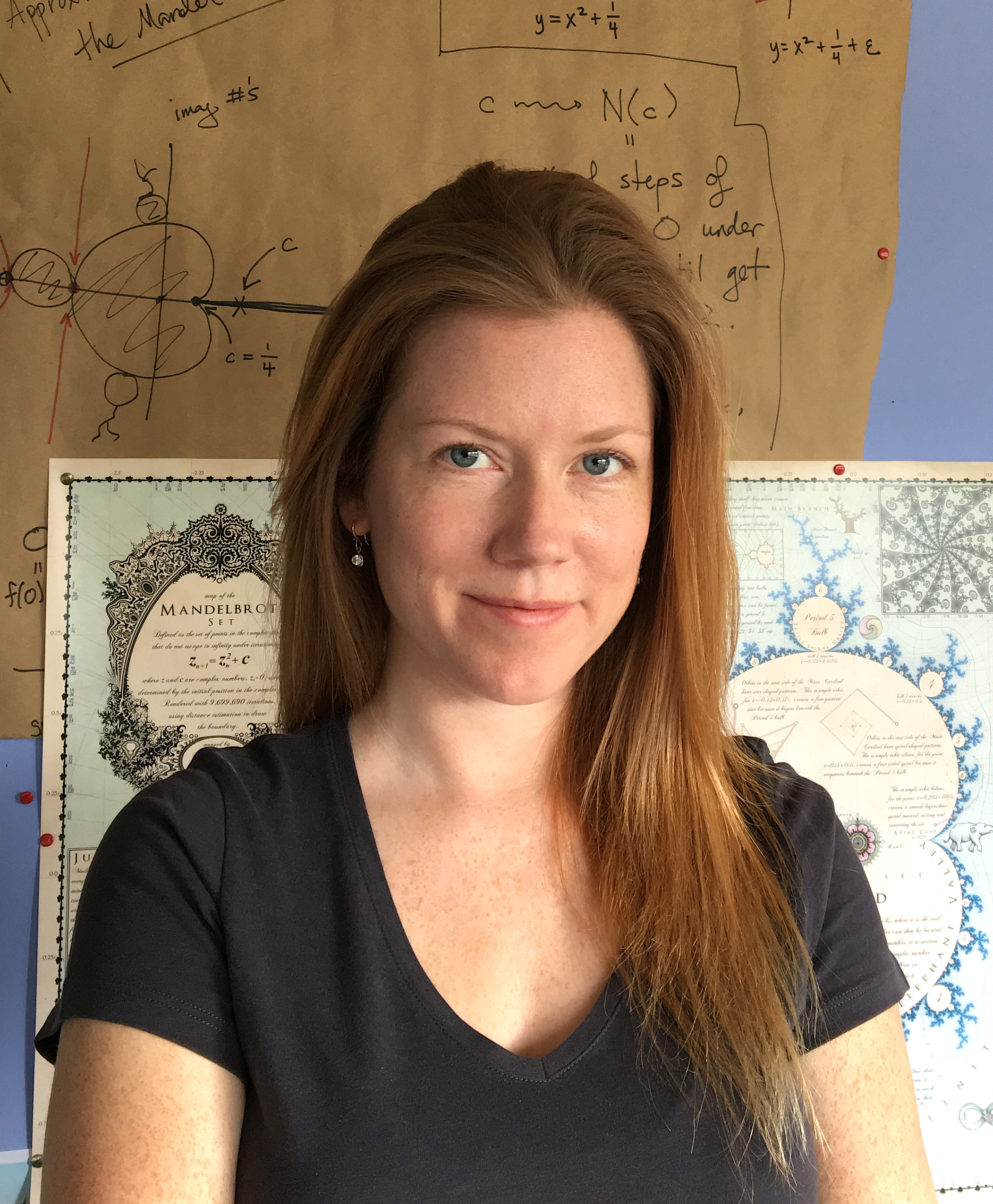AMSI supports eminent international researchers through the scientific program and its co-sponsorship of the Australian Mathematical Society’s biennial Mahler Lecturer program.
2019 Mahler Lecturer: Dr Holly Krieger

The Mahler lectures are a biennial activity organised by the Australian Mathematical Society, and supported by the Australian Mathematical Sciences Institute, in which a prominent mathematician tours Australian universities giving lectures at a variety of levels, including giving several public lectures.
In 2009 AMSI and AustMS partnered with the Clay Mathematical Institute, to combine the Mahler Lectures and the Clay Lectures into the Clay–Mahler Lecture Tour.
Dr Holly Krieger is currently the Corfield Lecturer at the University of Cambridge and a Fellow at Murray Edwards College.
Born and raised near Chicago, Dr Holly Krieger completed the undergraduate mathematics honors program at University of Illinois at Urbana-Champaign. She went on to a master’s degree and a Ph.D. from the University of Illinois at Chicago. Her initial research interests during graduate school were primarily in arithmetic and Diophantine geometry. Under the guidance of Laura DeMarco and Ramin Takloo-Bighash, her thesis work focused on the emerging field of arithmetic dynamics, which studies the relationship between dynamics of one complex variable and the arithmetic geometry of abelian varieties.
She followed her PhD work with an NSF postdoctoral fellowship at MIT under the supervision of Bjorn Poonen, during which time she became particularly interested in problems of unlikely intersections in complex dynamics. Since 2016, she has been the Corfield Lecturer at the University of Cambridge as well as a Fellow at Murray Edwards College.
https://www.dpmms.cam.ac.uk/~hk439/about.html
| DATE | TIME* | TITLE | VENUE | STATE | REGISTER |
|---|---|---|---|---|---|
| 22 November | 3.00pm | Mahler Lecture: Transcendence and dynamics | UNSW, Sydney. Room RC-4082, School of Mathematics and Statistics | NSW | |
| 25 November | 4.00pm | Mahler Lecture: Transcendence and dynamics | University of Newcastle. Life Sciences Lecture Theatre | NSW | |
| 26 November | 3.00pm | Mahler Lecture: Elliptic curves and complex dynamics | University of Sydney. Carslaw Building (F07), Room C273 | NSW | |
| 27 November | 2.00pm | Seminar: Number theory (title TBA). | University of New South Wales. Room TBA | NSW | |
| 28 November | 11.00am | Seminar: Algebra and topology (Title TBA) | Australian National University. Seminar Room 1.37, Hanna Neumann Building | ACT | |
| 28 November | 4.00pm | Mahler Lecture: Elliptic curves and complex dynamics | Australian National University. Seminar Room 1.33, Hanna Neumann Building | ACT | |
| 29 November | 4.00pm | Mahler Lecture: Transcendence and dynamics | UNSW Canberra. Room G23, Building 26 | ACT | |
| 2 December | 6.00pm | Public Lecture: A tour of the Mandelbrot set | The University of Melbourne. JH Michell Theatre (within the Peter Hall Building, 160 Monash Road, Parkville) |
VIC | Register for this FREE event |
| 3-6 December | NA | AustMS Plenary Lecture (Date TBA). (Title TBA) | Monash University, Clayton campus | VIC | |
| 9 December | 11.00am - 12.00pm | Seminar: Elliptic curves and complex dynamics | The University of Queensland. Room 14-116 (Sir Llew Edwards Building) Light refreshments will be provided after the lecture |
QLD | |
| 9 December | 6.30pm - 8.00pm | Public Lecture - The mathematics of life | Hosted by The University of Queensland. Auditorium 1, State Library of Queensland, South Brisbane. Refreshments will be provided following the lecture |
QLD | Register for this FREE event |
| 13 December | 11.10am | Seminar: Differential geometry (Title TBA) | The University of Adelaide. Room S12, Engineering North Building | SA | |
| 13 December | 2.10pm | Mahler Lecture: A tour of the Mandelbrot set | The University of Adelaide. Room LG28, Lower Napier Building | SA | |
| 19 December | 2.00pm | Mahler Lecture: A tour of the Mandelbrot set | University of Western Australia. Blakers Lecture Theatre | WA |
*(all times reflect host local time)
Please note: Public Lectures are suitable for all attendees with a broad science knowledge, while the Mahler Lectures will assume a university-level mathematics background. All are welcome to attend
A tour of the Mandelbrot set
The beautiful and complicated Mandelbrot set has captivated mathematicians since the first computer images of the set were drawn in the 1970s and 1980s. In this talk we’ll take a walk around the infinite intricacies of the Mandelbrot set, exploring the spirals, finding Fibonacci, and answering the question every maths student wonders when they first meet the Mandelbrot set: why do we care about this pretty picture?
abc for the working mathematician
The abc conjecture, formulated in the 1980s by Masser and Oesterlé, is one of the most important conjectures in number theory, and most discussed conjectures in mathematics in the last decade. Often omitted from this discussion is the justification that the abc conjecture among one of the most interesting problems in mathematics. We will discuss some of the non-number-theoretic connections to and implications of the abc conjecture and related Diophantine questions, and explain why mathematicians in any field should care about this simple and deep number-theoretic assertion.
Transcendence and dynamics
Many interesting objects in the study of the dynamics of complex algebraic varieties are known or conjectured to be transcendental, such as the uniformizing map describing the (complement of a) Julia set, or the Feigenbaum constant. We will discuss various connections between transcendence theory and complex dynamics, focusing on recent developments using transcendence theory to describe the intersection of orbits in algebraic varieties, and the realization of transcendental numbers as measures of dynamical complexity for certain families of maps.
Elliptic curves and complex dynamics
In the last decade, an exciting program has emerged connecting the arithmetic of elliptic curves to classical questions in complex algebraic dynamics; that is, the study of iteration of maps on complex algebraic varieties. We will discuss this program and the fruit it has yielded, providing a new and surprising approach to fundamental questions about the interaction between geometry and arithmetic of elliptic curves.
The mathematics of life
Mathematicians and biologists are learning together how to describe and study the complexity of living things, revealing sometimes unexpected connections to fields of pure mathematics which include number theory and topology. We’ll discuss some of the most interesting such connections, and understand what mathematics has to say about the evolution and development of life in our world.

